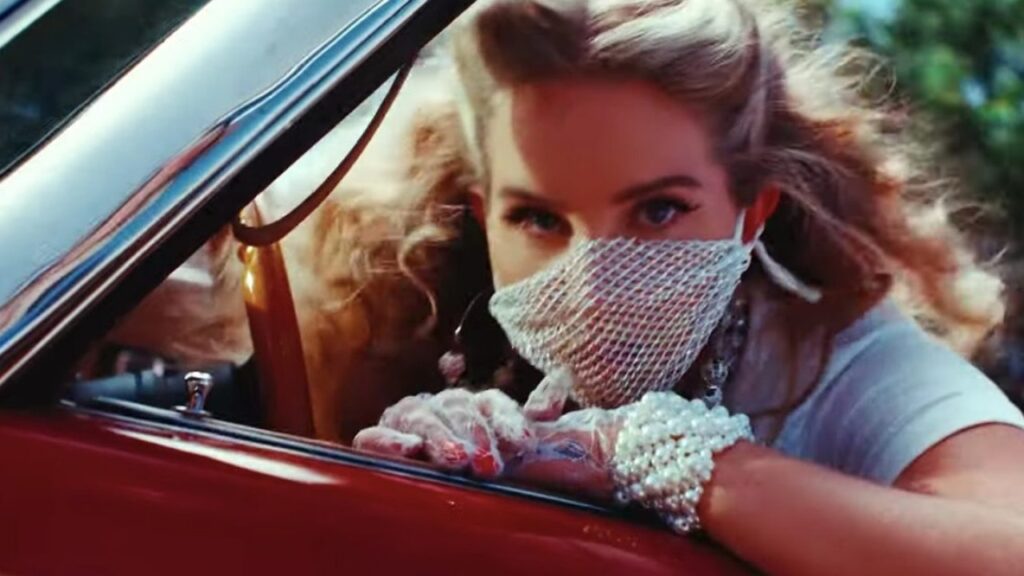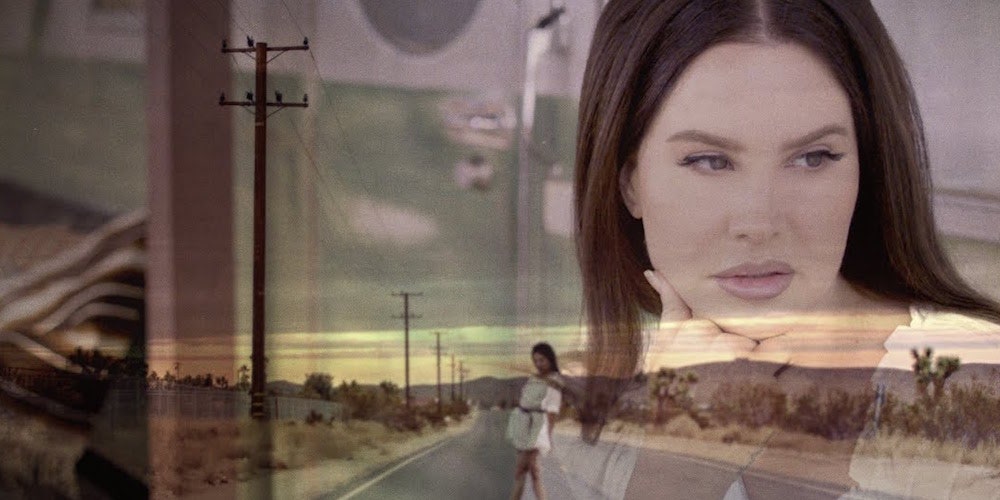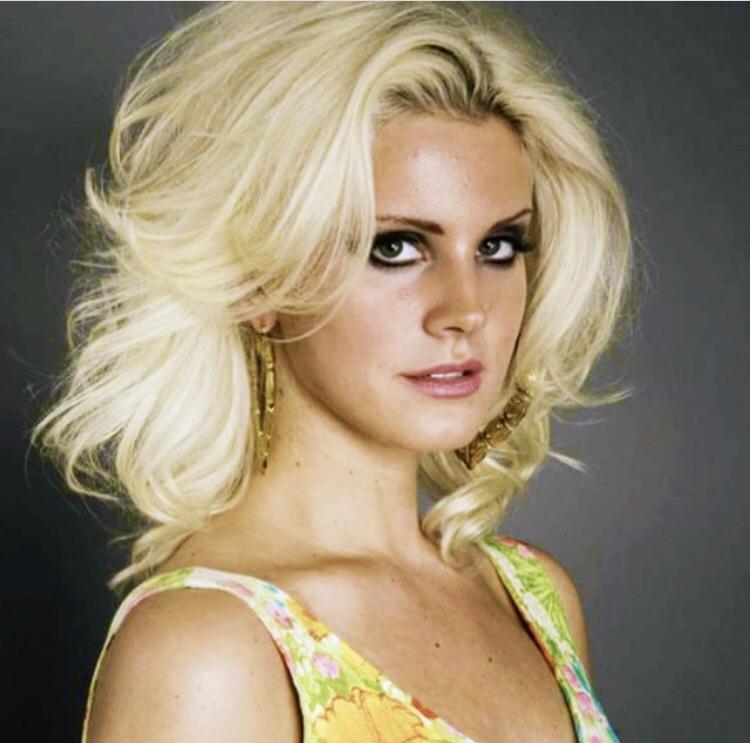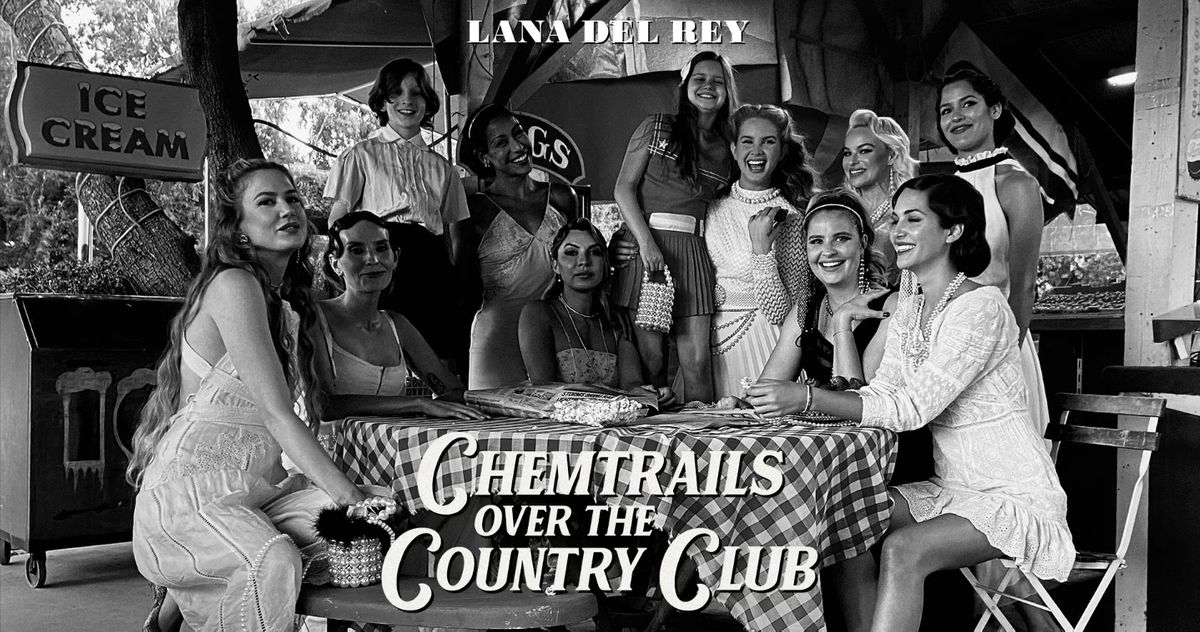There are few artists who simultaneously have the rabid fanbase, profound critical acclaim, cultural relevance, and seemingly constant backlash that Lana Del Rey does. Nowadays, it seems impossible to talk about Lana’s music without first engaging in a discussion of the public persona she’s created. When the title track for ‘Chemtrails Over the Country Club’ was released, even the most devoted Lana fans were quick to argue that the “chemtrails” she sings about are actually lines of cocaine, serving as a callback to the early days of her career where her songs mused on the seedy, sometimes even grotesque, underbelly of American party culture, romanticizing her casual drug use, relationships with older men, and life as a young starlet. The thread that binds Lana’s discography, even when she delves into the risqué, is an all-American vignette, in which cities are metaphors, Coca-Cola is a motif, and cherry red lipstick frames every lyric. As Lana has cultivated and matured her perspective on American life, her songwriting has matured with it, and yet in the public sphere, her musings on the political have transformed her into a uniquely polarizing figure. It seems as though there is a constant battle between the Lana stans and the casual listeners, where the former group seeks to defend her at every turn, dissecting each track in her discography for its hidden, and sometimes apparent, genius. When we look at the controversies Lana has become involved in, particularly in the past year, we can see where ‘Chemtrails’ was born from.
Whereas ‘Norman Fucking Rockwell!’ took a stab at the heart of the American political state, ‘Chemtrails’ feels more like Lana’s self-reflection on where she fits into the mythos she’s created. Whereas NFR features biting lyrics such as “Your poetry’s bad, and you blame the news,” Chemtrails doesn’t tap into that edge. There are moments of grandiosity, but overall, the record maintains an intimate, sometimes confessional, tone, which is reflected in the relatively sparse instrumentation. Though it is produced and cowritten by Jack Antonoff, whose lavish production on pop records such as Lorde’s Melodrama and Taylor Swift’s folklore has earned him countless accolades, the maximalist approach to cultivating a glamorous aesthetic is scaled back, with Antonoff acting as a one-man band, playing piano and guitar throughout the album. Thus, Chemtrails is filled with soft piano ballads and wafting folk-americana tracks, that turn the listener’s attention to Lana’s lyricism.
There is a distinct focus throughout the record on the transformation of Lizzy Grant into Lana Del Rey, and the turmoil of that transition. This is best exemplified in the album’s opener “White Dress”. Lana uses her voice rhythmically in the chorus, racing through the line “down at the men in music business conference” with a hushed rasp. It is at this conference where Lizzy Grant finally feels seen in a way she would never be able to working as a small-town waitress. But these men in music aren’t really seeing Lana for her art, rather, they see her as the newest woman they can commodify and package as a pop star. The white dress serves as a symbol for Lana’s femininity, the thing that ties holds her life within a cohesive narrative. While Lana recognizes the particular rush of ego that comes with rising to fame, she also recognizes the ways in which her very being has become something for others to consume and use, and the psychological toll of that. By the end of the song, she concludes “maybe I was better off” before she had to confront the reality of stardom.
In the title track, Lana diagnoses the sickness of the American upper-middle class, invoking images of swimming pools, expensive jewelry, her little red car, and the disconnected atmosphere of the country club. Through the veneer of propriety, the culture of this white suburban utopia controls its members, turning them into complacent, cruel people, emphasized through the metaphor of chemtrails, which douse them with the social chemical of status in order to keep them stagnant. The softly melodic piano ballad sends this message subtly, and if you look too quick the social critique may escape you as Lana’s invocations dance through these conventionally aspirational motifs.
This album focuses on the heartland of America, or at least where it seems Lana considers true Americana to be located. On “Tulsa Jesus Freak”, Lana dissects the relationship between the strict, prescriptive evangelism of the deep south and substance abuse. In the chorus, she sings, “You should stay real close to Jesus / Keep that bottle in your hand, my man,” calling out the hypocrisy of so-called “Jesus Freaks”. She mentions the famous Elton John song, “Candle in the Wind”, which was written as a tribute to Marilyn Monroe, a kind of eulogy in the wake of her tragic overdose. When Lana turns to substances, she can forget the tragedy they reap. What Lana is trying to say, is that these strict religious fanatics like to keep people close to what they think is Jesus, maintaining an insular feedback loop of a community. What they really end up tying people to is a longing for a higher power, without the freedom to find it for themselves. From Lana’s perspective, that futile search leads back to the bottle, creating entire communities in which there is a cognitive dissonance between what they perceive God wants from them, and the sins they fall prey to. When she says, “We’ll be white-hot forever”, she means that sometimes we assume a complete passion for God, or the man she’s singing to throughout the song, will last forever. But that initial passion can’t last forever, even as Lana forces herself to live out the delusion. Lana has always had a fraught relationship with religion, discussing it in less complex, but equally personal and poignant, terms on earlier songs like “Gods and Monsters”. But here, she explores the social and psychological effects religion can have, creating frenzy, paranoia, guilt, and sin in its wake.
Throughout the record, she dives into the transformation of her attachment throughout her life. On “Tulsa Jesus Freak”, she’s ok with staying with this man who turns to the bottle, because he’s the only thing that allows her to stay complacent in this toxic community. On the subsequent track “Let Me Love You Like a Woman”, she dives deeper into this idea, paying tribute to some of country music’s expectations for women in relationships. There is a faraway crooning on this track, giving it that country aesthetic, as Lana sings about her small-town origins and wanting to leave LA with her lover. She yearns for a simple femininity, where she can know that she will be alright as long as she stands by her man. Letting Lana love him like a woman means retreating into a constructed femininity, one that allows her to listen to her lover’s poetry and songs uncritically, simply appreciating him because that’s what she’s supposed to do. It’s easier to navigate life this way, to not be so focused on individual self-discovery or liberation, to play out the stereotype. Even though by the end of the song, she recognizes that she might not need her lover to join her in her escape, she still doesn’t know how to exist without her image being reflected back to her through a man’s eyes. This song is a tribute to Lizzy Grant, Lana’s younger self who thought things could be that easy.

But the next track “Wild at Heart” is in many ways the antithesis to the previous song, where Lana has matured enough to understand the ways she was influenced by the culture she’s enveloped in. She says how seeing “Your pretty pics on Sunset Boulevard” made her go crazy, turning her into someone who feels as though they can never measure up to the images they see in media. She smokes cigarettes, a self-destructive act, just to be able to understand the desolation of LA, embodied through the smog. If everyone is advertising how glamorous their lifestyle is, why does this city feel so empty and dirty at its core? But in the chorus, Lana has finally matured enough, and connected with herself enough, to be able to recognize the masks these people are putting on. Finally she can leave Calabasas, “Escape the ashes” and recognize that she is someone who is “Wild at Heart”, someone who can see the absurdity of fame and Hollywood and choose to reject it. It’s an incredibly empowering sentiment, that almost feels like Lana’s final response to her critics, saying “If you love me, you love me because I’m wild at heart”. Lana craves the ability to be candid, to be able to be free again.
When she references, “the cameras have flashes, they cause the car crashes,” she seems to be invoking the tragedy of Princess Diana. As Lana calls out the names of all of these fallen starlets, it seems as though she’s fighting to not have her story end the same way. This theme is explored more in the next song “Dark But Just A Game”, in which she sings, “Don’t even want what’s mine / Much less the fame / It’s dark but just a game”. As soon as the first silver screen was erected, celebrities became the idols of the new age. Though fame is considered aspirational, it so often ends in tragedy. Lana has come to consider it a game, meaning at some level she has forced herself to cut through the mystique of celebrity to recognize the economic interests vested in the entertainment industry.

There are countless references to women in the entertainment industry who were struck by tragedy. In “Breaking Up Slowly”, Lana dives into the story of famous country singer Tammy Wynette. Wynette is most well known for her song “Stand By Your Man”, in which she sings about the duty of modern women to accept their lover and support them no matter what, playing into a conservative ideal of domesticity. Wynette had numerous reproductive health issues, resulting in her undergoing multiple surgeries which left her addicted to painkillers. When she died of an eventual overdose, her husband George (referenced in the second verse) received several DUIs, saying that Tammy’s death left him incapable of handling daily life. It seems what Lana is saying in this song is that she cannot stand by a man who is entirely dependent on her because she performs the socially accepted role of a woman. She recognizes that the right thing to do, no matter how painful, is to be on her own for a while, and support herself in the same way she’s supported her various romantic partners. Using Wynette’s story is a form of reflection for Lana, who is constantly confronted with the tragedies of women in her position, who were ultimately killed by their status as women in society.
But she also references women who have empowered her to continue making art, such as in the song “Dance Til We Die”, where she sings about dancing with Joni Mitchell, Joan Jet, and Stevie Nicks. For Lana, these women represent a resistance to the pressure put on women in the music industry. Dancing until you die, for Lana, is a revolutionary act, one that can liberate other women around her.
On the track “Not All Who Wander Are Lost,” Lana really taps into the folk sound. This track is functionally a love song, where Lana expresses her appreciation for a partner who can interact with the world as she does. The true test of a relationship is not how many things you have in common, or all of the romantic gestures we have come to expect amidst the rise of social media; it’s that shared perspective and being able to feel truly understood. This song is not as lyrically complex as others on Chemtrails but makes up for it with the sonic experimentation Lana performs, with a simple country instrumental and folksy intimacy. The melody evokes a tenderness, where one of the most profound things one can say is a simple declaration of love.

“Yosemite” maintains this sonic continuity, with a haunting yet clean fingerpicked guitar and drums that waft from verse to verse. Lana references “Candle in the Wind” again, saying that her lover’s constant presence finally makes her feel stable again. Stability is the major theme of this track, as she sings, “Seasons may change / But we won’t change / Isn’t it sweet how we know that already? / Winter to spring / Spring back to fall / Isn’t it cool how nothing here changes at all?” The stability Lana’s lover provides her allows her to make order out of chaos within the broader world. Suddenly the changing of the seasons is a source of peace, instead of turmoil for the artist. Lana makes us long for a love that feels safe enough to mitigate the constant anxiety of living in our chaotic world.
On the final track, “For Free”, Lana teams up with Zella Day and Weyes Blood to cover the Joni Mitchell song. This seems like an incredibly fitting cover to finish the album with, as Lana once again celebrates the women in music who came before her. Even when Joni Mitchell wrote this song years ago, she was thinking about the pressures of the music industry, where the commercial viability is more important than the quality of the art. The album closes on a reflective note once again, with Lana using this song to declare that she is carving out her own space for her art.


You must be logged in to post a comment.